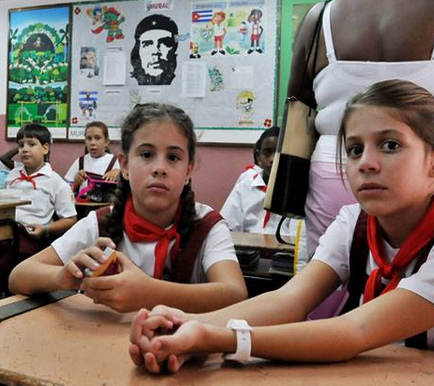Latin America’s best education system? According to a recent study by the World Bank, it’s in Cuba
By Salim Lamrani
According to a recent international study, Cuba is the only country in Latin America and the Caribbean to have a high quality education system.

A grade school classroom in Havana.
The World Bank recently published a report on the status of education in Latin America and the Caribbean. Entitled Great Teachers: How to Raise Student Learning in Latin America and the Caribbean, the study focuses on the continent’s public education systems and the major challenges they face.
In Latin America, kindergarten, primary and secondary teachers constitute, in human terms, a resource of seven million people, or four percent of the region’s workforce and more than 20 percent of all technical and professional workers. Their salaries absorb four percent of the continent’s GDP. Their working conditions vary from one region to another, even within national borders. Teachers, mostly women — 75 percent on average — are poorly paid and tend to be of lower socioeconomic status. In addition, the average age of teachers is more than 40. Thus they constitute a workforce considered to be “aging.”
The World Bank notes that all world governments scrutinize carefully “the quality and practices of teachers,” particularly at a time when the objectives of education systems are required to adapt to new realities. The emphasis is now on skills and not merely on the accumulation of knowledge.
The World Bank emphasizes “the poor quality of Latin American and the Caribbean teachers,” a condition that constitutes the main obstacle to the advancement of education across the continent. Further, academic content is inadequate and educational practices ineffective. Insufficiently or poorly trained teachers devote only 65 percent of their time to classroom instruction, “the equivalent of wasting an entire day of instruction per week.”
In addition, available instructional materials are under-utilized, especially those that deal with new information technologies and communication. Finally, teachers struggle to assert their authority, keep their students engaged and retain their attention.
According to the financial institution, with the notable exception of Cuba and possibly Ecuador, “no teaching faculty in the region can be considered to be of high quality when compared to global parameters.” The World Bank also notes that “today, no Latin American school system, with the possible exception of that of Cuba, has the high standards, strong academic talent, high or at least adequate salaries and high degree of professional autonomy that characterizes the world’s most effective educational systems, such as those of Finland, Singapore, Shanghai (China), the Republic of Korea, Switzerland, the Netherlands and Canada.”
The report said Ecuador has made the most impressive educational gains in the region, behind Cuba. “As a percentage of GPD, Ecuador has invested more in education than any other country in the region since 2007 and the results are impressive.”
The World Bank noted that Cuba has made education a top priority since the early 1960s, devoting 13 percent of the national budget to the cause.
This is not the first time that the World Bank has praised the education system of Cuba. In a previous report, the organization characterized the excellence of the island’s social system.
________________
Salim Lamrani is a lecturer at the University of La Réunion, Paris, and a journalist specializing in relations between Cuba and the United States.




















